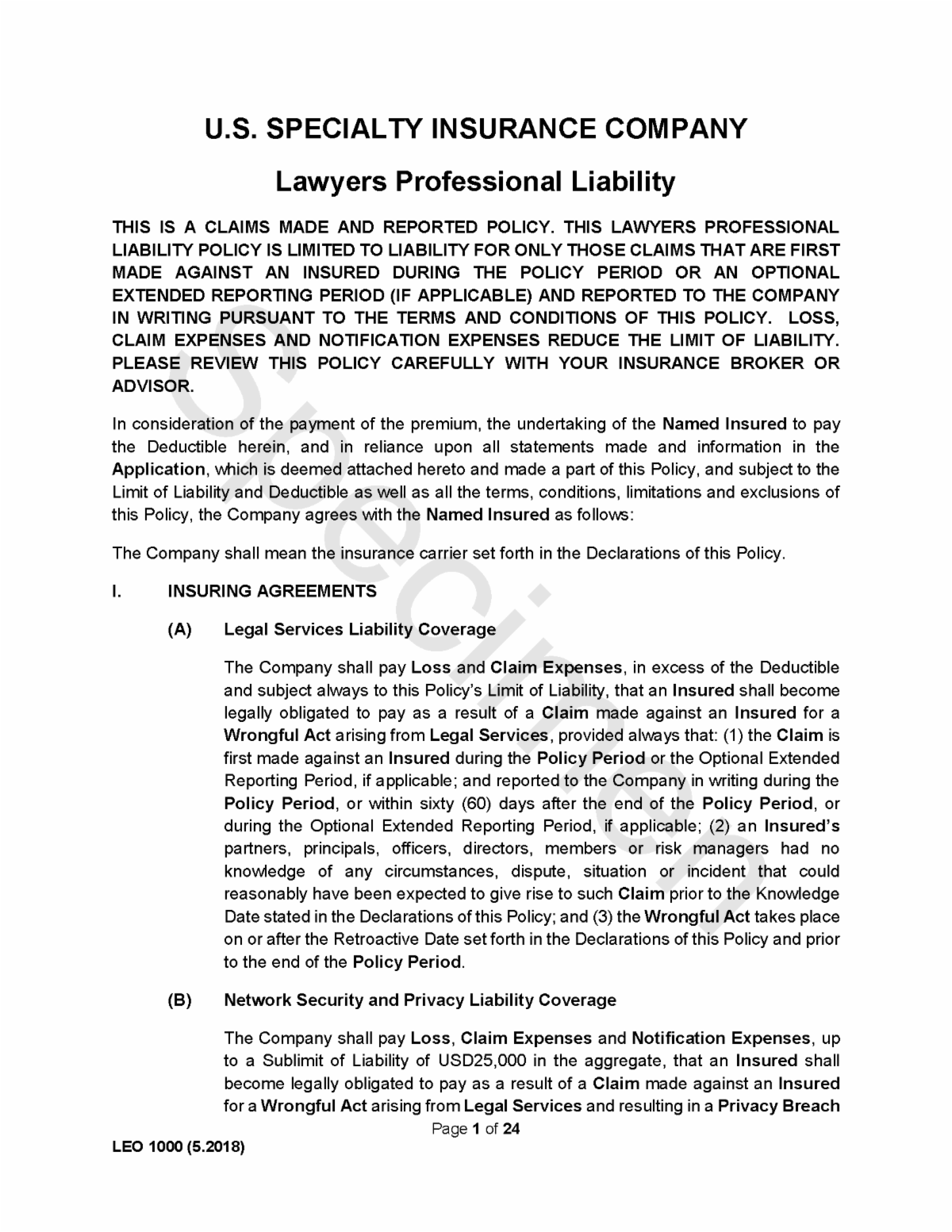
Attorney Malpractice Insurance Policies are claims-made and reported policies. When the coverage ends the ability to report claims for past acts ends at policy termination. Attorneys leaving private practice via retirement, becoming a judge or working in the private or public sector need to protect their past acts. Insurers will not renew attorney malpractice policies for attorneys that are no longer in private practice. Given this it is important for attorneys to protect their past acts once coverage ends. For solo practitioners and small firms that may close once the practitioner leaves, the nonpracticing Extended Reporting Period Endorsement/Retirement Tail (ERP) may be an answer.
Note: For attorneys closing or leaving their small firm to work at another law firm the nonpracticing Extended Reporting Period Endorsement/Retirement Tail (ERP) is not an option. Coverage for their past acts is outside of the scope of this blog.
Each insurer’s policy differs on requirements and wording for obtaining this valuable ERP endorsement at no or reduced cost. Careful planning by the attorney may save the attorney thousands of dollars. The ability to request an ERP differs by insurer but is time sensitive. Regardless of the insurer, the attorney must completely stop private practice to obtain the nonpracticing ERP.
The US Specialty policy provides a nonpracticing ERP based on the following policy language:
E) Extended Reporting Periods
(2) Non-Practicing Extended Reporting Period
(a) If an Insured dies or becomes totally and permanently disabled during the Policy Period, then such Insured (or the estate, heirs, executors or administrators in the event of death) shall be provided with a Non-Practicing Extended Reporting Period as provided in subparagraphs (i) and (ii) below, commencing upon the latter of the expiration of: the Policy Period; any renewal or successive renewal of this Policy; or any Optional Extended Reporting Period.
(i) In the event of death, the estate, heirs, executors or administrators of such Insured must provide the Company with written proof of the date of death. This Non-Practicing Extended Reporting Period is provided to the estate, heirs, executors and administrators of such Insured until the executor or administrator of the estate of such Insured is discharged.
(ii) If an Insured becomes totally and permanently disabled, such Insured or such Insured’s legal guardian must provide the Company with written proof that such Insured is totally and permanently disabled, including the date the disability commenced and certified by the Insured’s physician. The Company retains the right to contest the certification made by the Insured’s physician and it is a condition precedent to this coverage that such Insured agree to submit to a medical examination by any physician designated by the Company. This Non-Practicing Extended Reporting Period is provided until such Insured is no longer totally and permanently disabled or until such Insured’s death, in which case subparagraph (i) above shall apply.
(b) If an Insured retires or otherwise voluntarily ceases, permanently and totally, the private practice of law, during the Policy Period, and has been continuously insured by the Company for at least three (3) consecutive years, then upon request such Insured shall be provided with a Non-Practicing Extended Reporting Period commencing upon the latter of the expiration of: the Policy Period; any renewal or successive renewal of this Policy; or any Optional Extended Reporting Period.
This Non-Practicing Extended Reporting Period is provided until such Insured shall resume the practice of law.
In no event shall the Non-Practicing Extended Reporting period exceed ten (10) years from the date of commencement. No additional premium will be charged for any Non-Practicing Extended Reporting Period.
As used in this Section, X.(E)(2), the “private practice of law” means the practice of law performed by an Insured for a fee, including hourly, contingent or lump sum, as a sole practitioner or as a partner, officer, director, stockholder-employee, associate, manager, member or employee, of a law firm, or any agreement to act as an independent contractor or Of Counsel to a law firm. “Private practice of law” does not include the practice of law by an Insured on a pro bono basis or as an employee of an entity that is not a law firm or for an entity engaged in the business of supplying attorneys or Legal Services.
IV. DEFINITIONS
(G) Insured
“Insured” shall mean:
(1) the Named Insured designated as such in the Declarations of this Policy;
(2) any lawyer, partnership, professional corporation, professional association, limited liability company or limited liability partnership who is or becomes a partner, officer, director, stockholder-employee, associate, manager, member or employee of the Named Insured during the Policy Period;
(3) any lawyer previously affiliated with the Named Insured or a Predecessor Firm as a partner, officer, director, stockholder-employee, associate, manager, member or employee but only for Legal Services performed on behalf of the Named Insured or a Predecessor Firm at the time of such affiliation;
(4) any lawyer, law firm, partnership, professional corporation, professional association, limited liability corporation or limited liability partnership who acts as Of Counsel to the Named Insured or any non-employee independent contractor attorney or per diem attorney to the Named Insured but only for Legal Services performed on behalf of the Named Insured;
(5) any former or current employee, other than an employed lawyer, of the Named Insured or any Predecessor Firm, but solely for Legal Services performed within the course and scope of their employment by the Named Insured or any Predecessor Firm;
(6) the lawful spouse or Domestic Partner of an Insured (as set forth in paragraphs (2) or (3) above) for any Claim made against such spouse or Domestic Partner solely by reason of his/her status as a spouse or Domestic Partner of an Insured or his/her ownership interest in marital property/assets that are sought as recovery for such Claim, but only if the Claim does not allege any Wrongful Act by such spouse or Domestic Partner; and
(7) the estate, heirs, assigns or legal representatives of any Insured (as set forth in paragraphs (2), (3), (4) and (5) above) in the event of such Insured’s death, incapacity or insolvency, for any Claim made against the estate, heirs, assigns or legal representatives of such Insured solely by reason of his/her/its status as the estate, heirs, assigns or legal representatives of such Insured and only to the extent that coverage would have otherwise been provided under this Policy to such Insured.
(N) Named Insured
“Named Insured” shall mean the entity or individual designated as such in the Declarations of this Policy.
Switching insurers near retirement to save a few dollars may cost an insured attorney thousands of dollars to buy the same protection. Planning retirement or a transition out of private practice should be discussed with your malpractice insurance agent prior to ending private practice when possible.
CLICK HERE TO OBTAIN AN ATTORNEY MALPRACTICE QUOTE

Lee Norcross, MBA, CPCU
(616) 940-1101 Ext. 7080